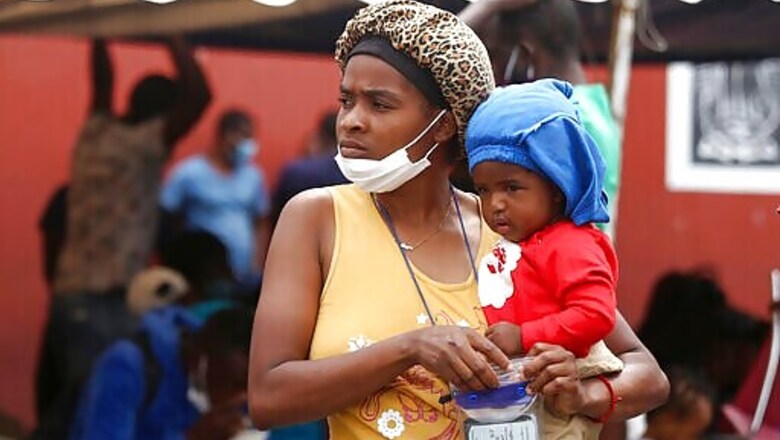
views
CIUDAD ACUA, Mexico: After more than a week at this crossing on the U.S.-Mexico border, Haitian migrant Nelson Saintil felt like the walls were beginning to close in on him and his family.
Saintil was along the banks of the Rio Grande on Wednesday morning with his wife and four children, ages 5, 10, 13 and 16. They had returned to Ciudad Acua the day before after eight days in the squalid camp in Del Rio, Texas, where as many as 14,000 migrants had gathered.
Reports of U.S. deportations to Haiti had pushed them back to Mexico, but the situation remained fluid. The family constantly reevaluated its situation based on imperfect information.
I dont want to be like the mice who dont know about the trap and get caught, because returning to Haiti is like being buried alive, Saintil said.
At the same time, he and others feared straying far from the growing river camp on the Mexican side, because Mexican immigration agents continued picking up migrants around town and conducting overnight raids at the small hotels where some stayed. The threat of possible deportation on both sides of the border created the sensation of an open-air jail, he said.
Without the sort of overwhelming show of force deployed by the United States and Texas on the north side of the border, Mexico has been ramping up efforts to relieve migrant numbers at this segment of the border.
National Guard troops accompanied immigration agents on operations during recent nights. Sometimes they picked up migrants from the street and loaded them into vans. In other cases they raided hotels.
Well before dawn Wednesday, a couple of immigration vans pulled up outside a small hotel in Ciudad Acua with National Guardsmen carrying rifles. Soon, shattered glass rained down from a second floor window and a woman screamed. Several migrants were led out with their hands secured behind their backs and loaded into a van.
Inside, an AP journalist found blood whose was unclear spattered on the tiled floor of the room in which they had been staying.
On Tuesday, Mexico flew the first planeload of migrants from the border city of Piedras Negras just downstream from Ciudad Acua to the southern city of Villahermosa. More flights were expected, including to Tapachula, near the Guatemala border.
At the same time, Mexico was trying to keep more migrants from reaching the northern border. Bus lines were reminded not to sell tickets to migrants without proper documentation. On Monday, immigration agents in the northern city of Monterrey, a key transportation hub for travel to the border, detained about 100 migrants at the bus station who were then flown to Tapachula.
Mexico also plans to begin direct flights to Haiti, which would initially target Haitian migrants already in Mexicos detention centers who have not applied for asylum. Those with open asylum cases would be flown or bused to Tapachula, according to a federal official who spoke on the condition of anonymity.
Little by little the migrant camp in Ciudad Acua was growing beside the Rio Grande. Small tents and tarps were sprouting to provide shelter for several hundred migrants, mostly families, in a scene reminiscent of camps that have appeared in other border cities like Matamoros, Reynosa and Tijuana in recent years.
On Wednesday morning, Antonio Pierre, 33, listened to the news on a friends cellphone. They are releasing some, but they are very few, he said. His wife and daughter were across the river in Del Rio. He had waded back across the river through waist-deep water just to charge his cellphone, but said it was possible the whole family would join him in Mexico before the day was through.
The humanitarian group Doctors Without Borders said in a statement Wednesday that it had been in Ciudad Acua since Monday offering services to the migrants.
The situation of dozens of thousands of migrants in Mexico, as well as the U.S., is unsustainable and of an extreme vulnerability due to the failure of asylum policies and continual deportations, it said. The group called the decision to expel migrants to Haiti, a country in crisis, unfortunate.
__
AP photographer Felix Marquez in Ciudad Acua contributed to this report.
Disclaimer: This post has been auto-published from an agency feed without any modifications to the text and has not been reviewed by an editor
Read all the Latest News , Breaking News and Ukraine-Russia War Live Updates here.

















Comments
0 comment